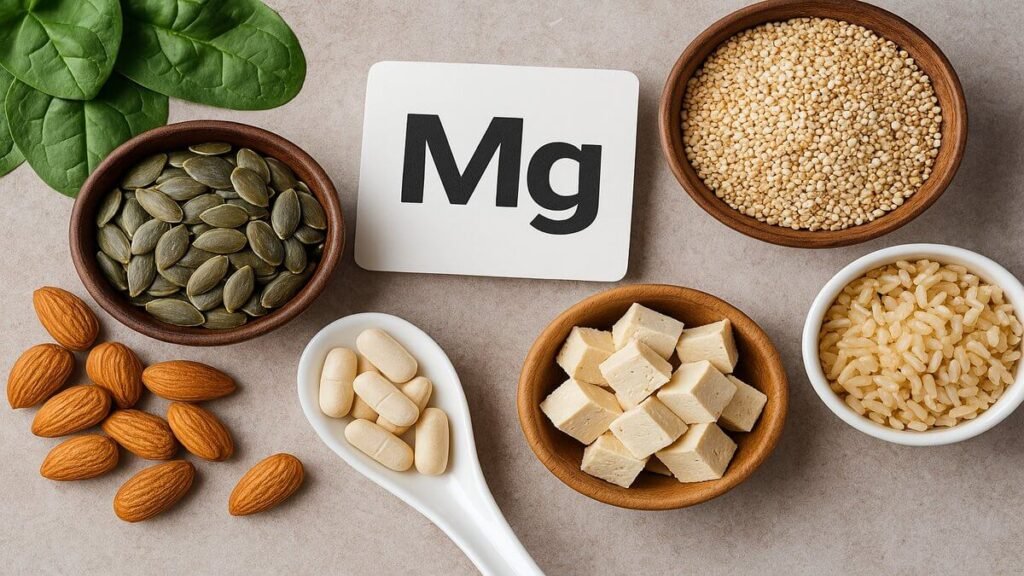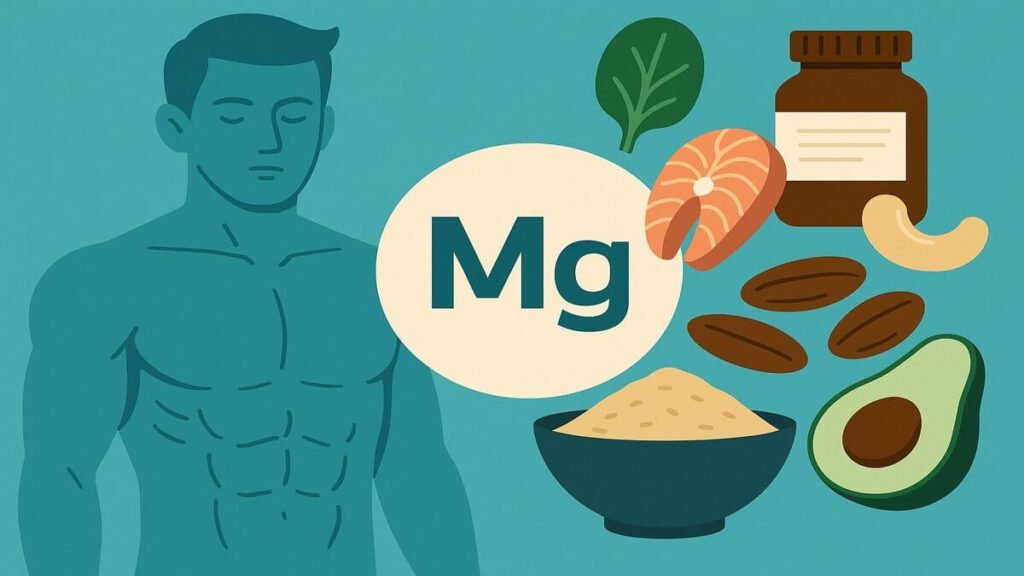THE magnesium supplementation has gained prominence among health and well-being care. This is because the magnesium is an essential mineral which participates in hundreds of reactions in the body, being essential for the proper functioning of muscles, nerves, heart and bones. In addition, it is related to emotional balance, sleep, metabolism and prevention of various diseases. In this article, discover the benefits of magnesium, understand what it is for, which types are most recommended and how to do it supplementation safely.
Summary
Explanatory video about the benefits of magnesium:
What is magnesium and how important is it for the human body?
THE magnesium is one of the most abundant minerals in the body, being essential for vital functions such as muscle contraction, transmission of nerve impulses and bone formation. It also regulates the functioning of more than 300 enzymes, which act in digestion, protein synthesis and energy production.
Furthermore, the magnesium is known for its calming effect and for participating in the metabolism of calcium and potassium. A deficiency in this mineral can impair neuromuscular function, affect cardiovascular health and even impact mental health.
What is magnesium used for in the body?
Magnesium plays a vital role in several physiological processes. It acts in the transport of calcium and potassium in cells, promoting muscle relaxation, balance of body fluids and control of heart rate. Also helps in the formation of bones and strengthening the immune system.

That essential mineral It is also essential for hormonal, digestive and neurological health. Its balanced action contributes to general well-being and the proper functioning of the entire body.
What are the main benefits of magnesium?
Among the benefits of magnesium, we can highlight:
- Reduction of stress and anxiety
- Improvement of sleep quality and humor
- Regulation of blood pressure and cardiovascular health
- Prevention of muscle pain, cramps and spasms
- Support for energy metabolism and glucose control
- Strengthening bones and preventing osteoporosis
- Improved concentration and memory
THE magnesium can also help in reducing the symptoms of PMS and menopause, in addition to bringing health benefits intestinal and digestive.
What causes magnesium deficiency?
THE magnesium deficiency can occur for several reasons: low dietary intake, excess alcohol, use of medications, chronic stress or diseases that affect intestinal absorption. lack of magnesium can cause symptoms such as:
- Frequent tiredness and malaise
- Dizziness, insomnia and irritability
- Headaches and migraines
- Muscle pain and tremors
- Health problems such as hypertension, anxiety and hormonal changes
In severe cases, the magnesium deficiency in the body can lead to neuromuscular disorders, arrhythmias and even seizures.
What are the best types of magnesium for supplementation?
The choice of best magnesium depends on each person's needs. Know the main ones types of magnesium:

- Magnesium chloride: favors the intestine and acid-base balance. The magnesium chloride is a versatile and highly absorbent option.
- Magnesium dimalate: great for energy and chronic pain. The magnesium dimalate is recommended for those who feel constant fatigue.
- Magnesium L-threonate: crosses the blood-brain barrier, indicated for memory and focus.
- Magnesium chelate or chelated magnesium: highly bioavailable form that is easy on the stomach. Ideal for continuous use.
- Magnesium bisglycinate: Excellent for relaxation and anxiety. Has superior absorption.
- Magnesium oxide: used in constipation and heartburn, but with low absorption. The magnesium oxide is useful for gastrointestinal symptoms.
- Magnesium taurate and magnesium malate: indicated for cardiovascular health and muscle function.
Each form of magnesium is recommended for specific purposes. Therefore, it is essential consult a health professional before starting supplementation.
👉 Magnesium is one of the highlights when we talk about health and performance. See how it fits in among the most used and recommended supplements in our complete guide.
What is the recommended amount of magnesium per day?
THE recommended amount of magnesium varies according to age, gender and individual needs. In general:
- Adult men: 400–420 mg/day
- Adult women: 310–320 mg/day
- Pregnant women: up to 360 mg/day
THE magnesium supplementation should consider total intake (food + supplements) to avoid excess.
What foods are rich in magnesium?
You foods richest in magnesium include:

- Dark leafy greens (spinach, kale)
- Cashews, almonds and pumpkin seeds
- Brown rice, oats, black beans and chickpeas
- Banana, avocado, dark chocolate
These are excellent sources of magnesium, which contribute to the intake of essential nutrients and promote health and well-being in the long run.
When is magnesium supplementation indicated?
THE magnesium supplementation is indicated when there is lack of magnesium in the diet or low intestinal absorption. It is also common in:
- Athletes and those who practice intense activities
- People with diabetes, high blood pressure or chronic stress
- Individuals with health conditions that affect the intestine
Take magnesium can correct deficiencies and improve the muscle function, in addition to preventing side effects of prolonged need.
Does magnesium supplementation have side effects?
Although food supplements are generally safe, the excess magnesium may cause diarrhea, nausea, and abdominal discomfort. In rare cases, especially in people with kidney problems, there may be a risk of toxicity.
Therefore, the magnesium supplementation it must be done responsibly. The ideal is always consult a health professional to adjust the correct dose to the specific needs.
Conclusion: Why is magnesium essential for the body?
THE magnesium is an essential mineral for the proper functioning of the whole body. It acts from energy metabolism to mental health, including muscle relaxation, hormonal balance, cardiovascular regulation and bone formation.

With so many health benefits, it is worth investing in a diet rich in this fundamental mineral, or resort to magnesium supplements of good quality, always with guidance.
Discover the benefits magnesium, adjust your routine and notice the positive effects on your overall well-being.
Key Points to Remember
- THE magnesium is an essential mineral for the human body
- Works in health muscular, bone, mental and cardiovascular
- THE lack of magnesium can cause various physical and emotional symptoms
- THE magnesium supplementation is indicated when the diet does not meet the demand
- There are different magnesium forms, like the magnesium chloride, dimalate, chelate, threonate and taurate
- It is important to maintain adequate magnesium levels for general balance
- Prefer magnesium rich foods and use supplements with accompaniment
- THE magnesium for your health is a powerful ally in your lifestyle
Frequently Asked Questions About Magnesium
What can magnesium do for the human body?
THE magnesium participates in metabolism cellular, regulates muscle function and helps with electrolyte balance. It also improves sleep, humor and focus.
What is the best form of magnesium?
It depends on the goal. For relaxation, the bisglycinate; for memory, the l-threonate; for general use, the magnesium chelate or dimalate. Always look for the best magnesium according to your need.
Is it safe to take magnesium every day?
Yes, as long as the recommended daily amount of magnesium. The ideal is to consider the total food and supplement intake.
What are the signs that I am low on magnesium?
Cramps, fatigue, irritability, insomnia, headaches and palpitations can be signs of low magnesium levels. If these symptoms persist, consult a health professional is essential.
Who should not take magnesium supplements?
People with kidney failure should be careful, as magnesium can accumulate in the blood. In such cases, magnesium supplementation should only be done under medical guidance.



